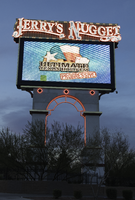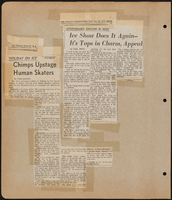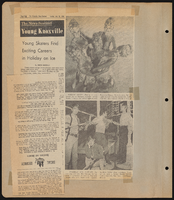Search the Special Collections and Archives Portal
Search Results

Transcript of interview with Joanna S. Kishner by Barbara Tabach, January 10, 2017
Date
Archival Collection
Description
Joanna Kishner epitomizes the native Southern Nevada who was raised in both a Jewish and secular world of Las Vegas. A daughter of Ellen Neafsey Jobes and Irwin Kishner, she was born in 1964 and graduated from Clark High School in 1982. As she recalls, the halls of Clark High School witnessed a stellar cast of characters in the early 1980s, from future casino executives, to additional judges, to comedian Jimmy Kimmel. Judge Kishner earned a double major in Political Science and Psychology from Claremont McKenna College (1986) and graduated from UCLA School of Law (1989.) She remained in California and worked as senior counsel for Warner Brothers, a division of Time-Warner Entertainment Company and was also an associate with the multi-national firm Paul Hastings Janofsky & Walker. In time, she felt the tug to return to her childhood roots in Las Vegas. She and her husband were married at Temple Beth Sholom, where she had her bat mitzvah and raises her own children in the Jewish tradition. Judge Kishner has been recognized for her legal work throughout the years, this includes pro bono work for disadvantaged children through the Children’s Attorney Project. When she set her sights on becoming a judge, she was joined by her young family as she knocked on thousands of doors to introduce herself and her passion for justice. In 2010, she was elected to Department XXXI of the Eighth Judicial District.
Text
Audio clip from interview with Hermina Washington, March 2, 2013
Date
Archival Collection
Description
In this clip, Hermina describes her family roots and early schooling in Las Vegas.
Sound
Audio clip from interview with Doug Unger, August 26, 2014
Date
Archival Collection
Description
Part of an interview with Doug Unger on August 26, 2014. In this interview, Unger discusses how he acquired Supreme Mattress, a local mattress company that supplied mattresses to Strip casinos.
Sound

Transcript of interview with Marian Beltran Decaro by Frank Murillo, March 27, 1977
Date
Archival Collection
Description
On March 27, 1977, Frank Murillo interviewed housewife Marian Beltran Decaro (born September 7th, 1914 in Flagstaff, Arizona) in her home in Las Vegas, Nevada. This interview covers the history of Las Vegas, Nevada’s first Mexican restaurant. Mr. Decaro is also present during the interview. Additionally, Mrs. Decaro recalls the first atomic bomb test in Las Vegas and also offers an overview of the growth of the area, overall, including the development and demographic details of such distinct historical communities as the Westside.
Text

Transcript of interview with Louis Evans by Jeannettte Lonpergan, February 17, 1976
Date
Archival Collection
Description
On February 17, 1976, Jeannette Lonpergan interviewed well driller and dairy worker, Mr. Louis Evans (born on August 8th, 1914 in Jones County, Iowa) in his home in Las Vegas, Nevada. Mrs. Lonpergan’s husband, Mr. Dennis Lonpergan, was present during the interview and joined in on the discussion. Mr. Louis Evans’ wife, Mrs. Evans, was also present during the interview. Mr. Evans relocated to Nevada from Iowa in search of employment. Construction on the Hoover Dam had begun at this point; Mr. and Mrs. Evans recall their earliest recollections of Nellis Air Force Base and McCarran Airport. The interview covers the history of Nevada from Mr. Evans’ perspective. Mr. Evans discusses the paving of roads, employment, religious activities, housing developments, early above ground atomic tests, social and environmental changes and mining in Nevada.
Text

Photographs of Jerry's Nugget Casino sign, Las Vegas (Nev.), March 17, 2017
Date
Archival Collection
Description
Site address: 1821 N Las Vegas Blvd
Sign owner: The Stamis Family
Sign details: In 1964, Jerry Stamis and Jerry Lodge opened Jerry's Nugget Casino. The property, formerly the Towne House Bar, was converted into a casino. Four years after its opening, the owners bought the nearby Bonanza Club along with its sign, adding an additional 10,000 square feet to their property. The site has undergone numerous renovations, including in 1982 when it became a full-service casino complete with a restaurant, bars, and nearly 700 slots. The porte cochere was also added at that time. In 1996, a theatre lounge was added as well as a bakery and even more gaming tables. The casino, which celebrated its 50th anniversary in 2014. This location still claims to cater to "locals." Currently, it consists of slots, table games, keno lounge, and a bingo hall, among other popular features.
Sign condition: About 4-5, appears to have relatively low damage
Sign form: Sculptural pylon
Sign-specific description: Neon sign looks to be in the form of an oil derrick, "Jerry's" in a nugget shape at the top, "Nugget" spelled downward in light blue neon, possibly was once orange.
Sign - type of display: Neon
Sign - media: Steel
Sign environment: Located in North Las Vegas along Las Vegas Blvd, near the Silver Nugget Casino.
Sign - date of installation: 1964 for most of the signage for the property
Sign - date of redesign/move: 1982 Porte Cochere added with expansion
Sign - thematic influences: The signage conveys the Old West theme of striking it rich with gold, silver or oil, as they have an oil rig for portion of their sign.
Survey - research locations: Neon Museum tour outline, Jerry's Nugget website http://www.jerrysnugget.com/ , recorder's office, Assessor's page
Survey - research notes: For the 50th anniversary of their Company they donated the money for the restoration of their sign which is showcased on the documentary "Restoration Neon" and remains in the Neon Museum.
Surveyor: Carlyle Constantino
Survey - date completed: 2017-07-12
Sign keywords: Neon; Steel; Pylon; Incandescent; Back to back; Reader board; Video screen
Mixed Content

Meeting minutes for Consolidated Student Senate University of Nevada, Las Vegas, October 4, 1984
Date
Archival Collection
Description
Text
UNLV University Libraries Collection of Architecture Drawings
Identifier
Abstract
UNLV University Libraries Collection of Architecture Drawings contains original hand-drawn architectural drawings, print reproductions, computer generated prints, and board-mounted artist renderings dating between 1926 and 2003. The collection primarily focuses on Las Vegas, Nevada, but also includes projects throughout Nevada and other states including Utah, Arizona, California, Mississippi, and Colorado.
Archival Collection


